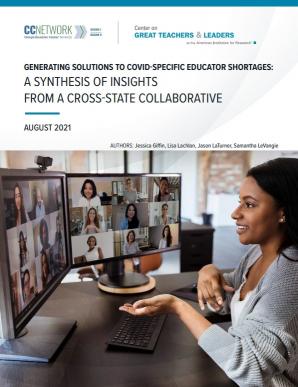Comprehensive Center Network: Cross-State Collaborative on Educator Shortages and COVID-19

The COVID-19 pandemic exacerbated many of the long-term educator shortages across the country. To address the shortages, many districts and school relied on policies such as utilizing long-term substitute teachers or loosening licensure requirements.
However, these strategies may have worsened the long-term, systemic challenges exacerbating educator shortages, particularly in underserved schools that serve students of colors and face chronic shortages.
Over the past year, I have come to understand more deeply that the value of conferences/gatherings is the conversation that occurs in the hallways and breakfast tables. This series was the first that helped me make connections with peers in other states to whom I could reach out as thought partners.
- Collaborative Participant
To help state education agencies (SEAs) consider strategies that will not further exacerbate systemic teacher shortages, the GTL Center and Region 1 and 9 Comprehensive Centers established a Community of Practice of SEAs, districts, and other stakeholders to collaboratively develop COVID-specific educator shortage solutions alongside experts and peers.
AIR's Approach
The Educator Shortage Cross-Collaborative facilitated five peer-to-peer engagements. Using a collaborative inquiry protocol, state teams shared a topic-specific problem of practice and received feedback, ideas, and collective brainstorming with their peers and experts.
Project Outcomes

Explore key takeaways from each collaborative session, news highlights and articles, and resources curated to address the following session topics:
- Leveraging Educator Preparation Programs and Engaging Teacher Candidates to Fill Learning Gaps
- Understanding How Addressing Substitute Teacher Shortages May Exacerbate Equitable Access to Quality Teaching
- Innovative Teacher Staffing Models
- Preventing Teacher Attrition and Early Retirement
- Investing in Teachers First: A Discussion of New Federal Opportunities

